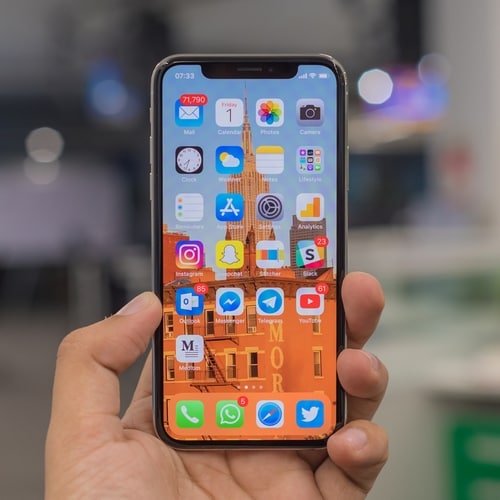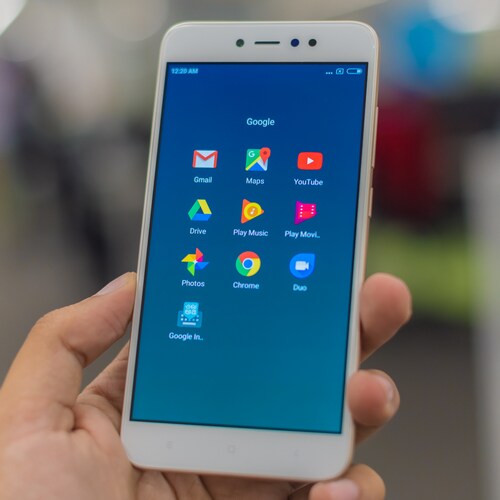One thing that has been a constant complaint with old iPhone users, is that they notice a hit in the performance once the new iOS updates start to roll out. "The phone is becoming slow", "Battery life is horrible after that new update" and so on, are the most oft-repeated rants of older-gen iPhone users.

An Apple iPhone 7 and the company logo. Image: Reuters
While one may have attributed this to the fact that the older hardware is not capable of putting up with the software improvements and the ever-demanding apps, it is now proven that Apple does indeed throttle processor clock speeds on older iPhones for peak performance demands. This is being done to ensure an older battery does not cause issues such as shutdown when the iPhone is operating at peak performance power.
This year, they have expanded the feature which does that to the iPhone 7 as well!
The Geekbench discovery
Benchmarking platform Geekbench ran tests to demonstrate that older iPhones do show a drop in single core scores after the iPhone 6s was updated from iOS 10.2.0 to 10.2.1 and with the iPhone 7, a similar drop was noticed when moving from iOS 11.1.2 to 11.2.0. The rate at which Apple is releasing updates on iOS 11 could potentially show progressive drops on older devices as well.
As the Li-ion battery that powers the iPhones ages, it becomes less capable of supplying peak current demands and the battery drains faster. This is true not just the iPhones but Android phones as well. The peak current demands last for short bursts of time in normal usage behaviour, unless you are running a benchmarking tool where processor cores are firing on all cylinders. In real-world usage, peak demands may be experienced while opening apps or playing that intensive game and so on. So instead of operating at peak clock speed for these tasks, Apple throttles these peak speeds, which will prevent behaviour such as random shutting down of the phone as was observed with the iPhone 6 and 6s in the past.
Geekbench also pointed out that due to this and the misconception about peak performance throughout the life of the device, users think that Apple intentionally slows down their devices as part of ‘planned obsolescence’.
So it's true Apple intentionally slow down old iPhones. Proof: My iPhone 6 was bought 3years ago and recently got really slow. APP 'CPU DasherX' shows iPhone CPU is under clocked running at 600MHz. After a iPhone battery replacement. CPU speed resumed to factory setting 1400MHz. pic.twitter.com/pML3y0Jkp2
— Sam_Si (@sam_siruomu) December 20, 2017
Apple's response
Apple has acknowledged the issue of slowing down of the iPhones, as a measure to ensure there are no random shutdowns during peak power conditions. Speaking to TechCrunch, Apple said, "Last year we released a feature for iPhone 6, iPhone 6s and iPhone SE to smooth out the instantaneous peaks only when needed to prevent the device from unexpectedly shutting down during these conditions. We’ve now extended that feature to iPhone 7 with iOS 11.2, and plan to add support for other products in the future."
According to Apple, the idea is to deliver customers with the best experience when it comes to overall performance and prolonging the battery life of their devices.
Technically, Apple is doing the right thing to ensure that your phone does not misbehave due to a deteriorating battery. Every phone that is powered by a Li-ion battery will notice battery life degrading over time, that is a battery chemistry issue and unless we have a brand new battery tech, we will have to just suck it up.
But that is not the point.
Being more pro-active
Unlike users getting a notification when the iPhone is going into the 'low power mode', there is no prior information on the reduced performance when Apple reduces the clock speeds on older iPhones. If the deterioration of the Li-ion battery is causing Apple to make these decisions, it is pertinent that consumers are kept informed pro-actively. John Poole from Primate Labs, which conducted the testing, says, "A notification stating that the battery needs service would be a simple way to reduce users’ concerns and help them address this problem.”

Apple CEO Steve Jobs appears on stage during a news conference at Apple headquarters in Cupertino, California, July 16, 2010. REUTERS/Kimberly White
This sort of reactive stance makes it look like Apple is correcting some glaring error. We have seen in the past how Apple reacted to issues like 'bend-gate' or 'antenna-gate'. In an age when its competition is as tough as it gets, Apple owes it to its consumers to let them be on the top of these things without someone having to point it out.
All batteries lose capacity over time and with that, the ability to deliver peak voltages. If you charge your phone once a day, expect to lose about 15-20 percent capacity by the end of the year. If you charge it more often, the battery will lose capacity faster. After 2-3 years of regular use, you'll be lucky if you have even 60 percent capacity left in that battery.
This line in Apple's statement, "We’ve now extended that feature to iPhone 7 with iOS 11.2," is kind of alarming. The iPhone 7 is just a year old. When Apple says that this feature has been extended to the iPhone 7 with iOS 11.2, does it mean that iPhone 7 users have to start looking for battery replacement now or three months down the line?
This naturally creates an ambiguity, and adds fuel to the fire of 'planned obsolescence'. This means it lets a lot of people believe that Apple is intentionally throttling older iPhone performances to ensure consumers switch to the latest iPhone — thereby letting Apple increase its sales bottom line. Whether Apple actually does something like that or not is something only the company's shareholders know.
Though it bears mention that Apple supports older devices far longer than any of its Android counterparts. 2013's iPhone 5S, for example, is still getting updates, unlike Google's Nexus 5 and other Android devices of that era.
If you are worried about performance degradation, you don't need to upgrade to a new phone, just replace your battery.
Published Date: Dec 21, 2017 01:16 pm | Updated Date: Dec 21, 2017 01:39 pm























